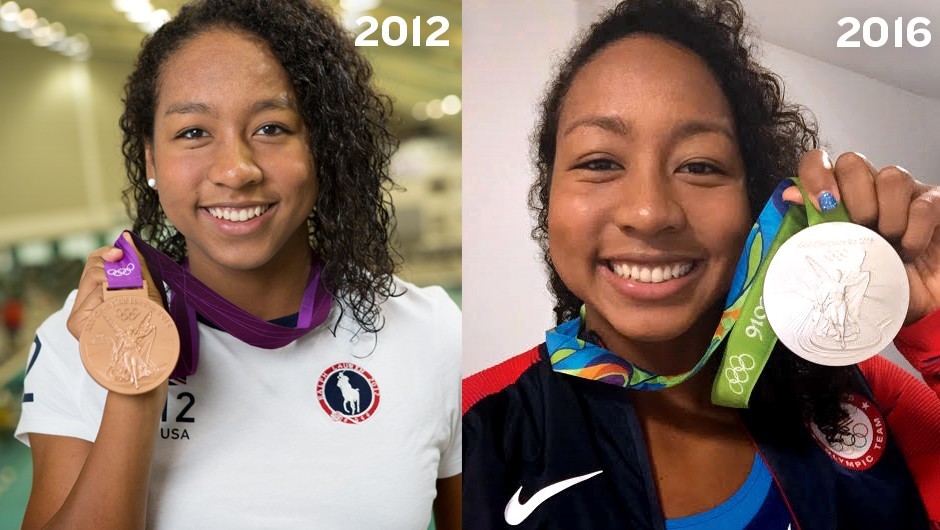Two-time Olympic medalist, professional swimmer, and former AGUA athlete Lia Neal visited our current swim team athletes virtually. Through a Q&A on Zoom, she shared her experiences, advice, and what she is doing to stay in shape mentally and physically while self-isolating.
Some responses have been edited for clarity.
Q: What is the greatest challenge you have faced in swimming what advice would you give to someone trying to overcome the same challenge?
A: Plateauing is the greatest challenge for me. One way to look at it is that everyone goes through that, even the best in the world. The moments that you do plateau are crucial moments that test your resilience and your training ethic and mentality. The highest ranked people are those with the toughest mental game. You can put in the work physically, but if you’re not in it 100 percent in your head, you can‘t reap any of the benefits of your training. If you stick with it, have your goals, and visualize yourself achieving those goals, it will eventually happen for you.
Q: What is your most memorable race? Why?
A: My most memorable race is the first event that I made the Olympic team in 2012 in the 100 freestyle. Going into Olympic Trials, I actually thought my best chance at making the team was the 200 freestyle. For the 200 freestyle, you could tell everyone was nervous, including me. I added 3 seconds to my time and didn’t even get to swim in the semifinals.
After, I had my moment, broke down, and cried because I thought that was my best shot, and I blew it. But I refocused and got ready for the 100 freestyle. I told myself, “I wasted my 200 free chance by letting nerves get the best of me. I actually want to seize this second opportunity to make the Olympic team.”
Olympic Trials has prelims, semifinals, and finals. If you finish in the top 16 in the prelims, you make it to the semifinals, and the top eight from the semifinals make it to finals. I took it one race at a time and qualified in the eighth spot to make it to finals. The top six make the Olympic team, so I knew I had to beat two people. I had to sprint going out, and it was the first time I swam 100 free with so much guts. It was the hardest 100 free of my life. I came in fourth and made the Olympic team.
Q: What is the best piece of advice you would give to a young swimmer?
A: My best advice would be to really treasure every moment. Some of the best memories I have in the sport are from age group swimming. Appreciate where you are and the opportunity that you’ve been given to swim.
Q: If could change one thing from your swimming career, what would you change?
A: Making my first Olympic team in 2012 was such a whirlwind. I would give myself advice to be more present and live in the moment.
Q: Is there anyone in particular you like racing?
A: I don’t like to compare. I think it’s better to just compare yourself to your own times—that’s how I progressed. I think it’s more important to focus on the things you can control, which is your own swimming.
Q: During this time that we can’t swim, what are you doing to stay fit?
A: Even though, I can’t swim in the pool, I still have opportunity to get stronger in other areas. I always really liked dryland training. I do core workouts with my team over Zoom, which is a good way to work out and see each other. A lot of people are hosting livestream classes on Instagram for free. Even though we don’t have the pools to train in, it’s still really fun to find ways outside the pool to train and get better. I jump rope to get extra cardio. it also helps mentally getting those endorphins going, getting moving. We will be better prepared when get to swim in pools again.
Q: For this particular situation, what’s your advice for when we do get back in the water? Advice for staying motivated?
A: I get a lot of my motivation by watching old videos of world championships, Olympics, and world cups. I love watching the best in the world, how easy they make swimming look. YouTube is a great resource with endless archives of footage. Nothing gets me more hyped than montages of the best swim moments. It sounds nerdy, but just watching gets your heart and adrenaline pumping.
Q: Can you talk about transition between age group swimming and college swimming?
A: There’s definitely a huge transition. I was exhausted all of freshman year because the training in and out of the pool is different. There’s a bit of an adjustment period in the beginning. You have your teammates to look to for inspiration. You know if your teammates can do it, you can do it as well. If you’re struggling, don’t feel like you can’t show any vulnerability or weakness. In more cases than not, they are going to be feeling the same way. No one is superhuman.

